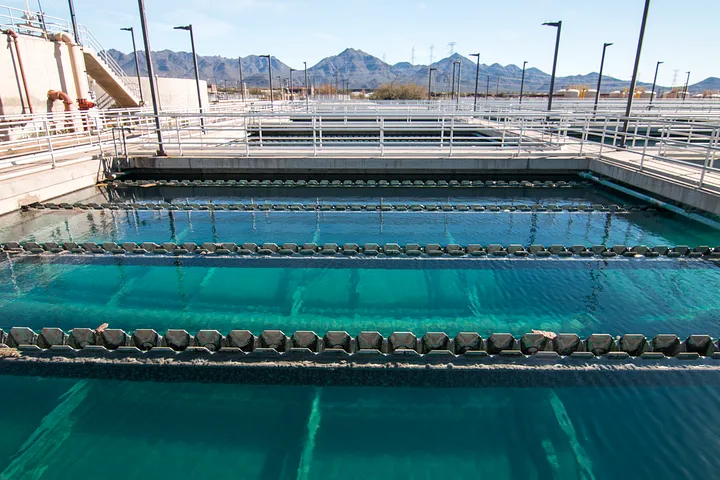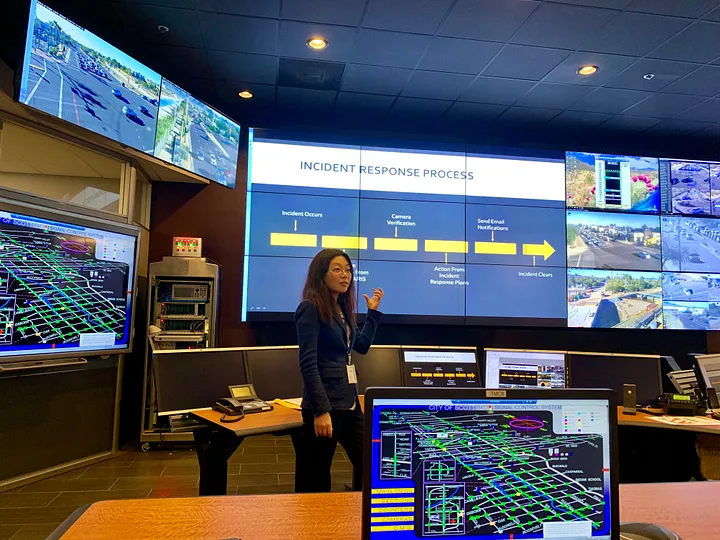Scottsdale, Arizona, USA
From the Pony Express to AI Traffic Control: Scottsdale Drives toward the Future with Data.
Project Type:
Communications, High-Performing Government, Infrastructure, Parks & Recreation, Technology, Transportation

2023 Gold Certification & 2024 Gold Certification
For several years the City of Scottsdale has been tracking and monitoring short-term rental properties and complaints about them. In 2022, the Arizona Legislature passed a law allowing cities to license short-term rentals and regulate nuisance properties. The City quickly sprang into action, adopting rules requiring short-term rentals to be licensed and creating Good Neighbor Guides to educate short-term rental property owners and their neighbors about the requirements. The CIty also created a Short-Term Rental Map Tool that allows residents to view the license status and understand the impact of short-term rentals in their neighborhoods. The Map Tool draws on the City’s Data Service Standard – one of the first cities in the United States to publish one – that guides the City in developing reliable and informative data services and products for its residents and businesses.
2019 Silver Certification
Launched an open data portal that provides performance data to collective benchmarking databases, which allows cities to help each other set more informed targets and put their own progress into perspective.
Used predictive analysis to calculate yearly projected water needs, which has allowed the City to continue a 20-plus-year streak of pumping less groundwater out of its aquifers than it puts back in.
Teamed up with the Behavioral Insights Team (BIT) to identify the effectiveness of messages on utility bills through randomized control trials that led to more customers choosing eco-friendly, cost-effective options such as signing up for paperless billing.
Analyzed the effects of altering traffic signals after prior accidents to develop data-based, location-specific plans for minimizing traffic jams after future accidents.
Honoring Scottsdale’s Memory
The skies were clear blue at noon as a crowd cheered the world’s oldest official Pony Express to the end of its 200-mile journey, outside the Museum of the West, in Old Town Scottsdale. This annual delivery of 20,000 pieces of first-class mail is among the special events and other attractions that bring about 9 million visitors and around $41 million in tax revenue to this Southwestern city each year. Old Town, the City’s downtown, still grows olive trees from its first days of settlement in the late 1800s, at the same time that it has become the spring home of the San Francisco Giants and begun to emerge as a center for high-tech businesses. It’s just one manifestation of how Scottsdale, the “West’s Most Western Town,” is a city that remembers its past while steadfastly preparing for the future.

Adopting a Business Mindset in City Hall
Scottsdale stands out for adopting a business mindset to run a well-managed government, embracing transparency so that residents receive the information they deserve, and embedding data in decision-making to ensure the best outcomes. And the efforts are paying off — in conserving water, serving vulnerable residents, minimizing traffic jams, and beyond.
Scottsdale joined What Works Cities in June 2016 and, soon after, codified an open data policy and launched an open data portal. Scottsdale has also deepened its citywide performance management. City Manager Jim Thompson says, “When we look at data and analytics, even though we assumed something was best, when we overlay old data with new or more specific data, we may find a new way to do things.” To continuously evaluate progress is to continuously improve.
The City is publicly reporting on that progress through a public-facing performance management portal, and provides performance data to collective benchmarking databases, an effort that allows cities to help each other set more informed targets and put their own progress into perspective by comparing themselves to other similar municipalities regionally and nationally. Scottsdale has gone on to earn a 2018 Certificate of Excellence in performance management, the highest distinction, from the International City/County Management Association.
If it’s a flaw in a process that’s causing shortcomings in performance, Scottsdale has a solution for that, too: a cross-departmental team that helps colleagues from across City Hall implement process improvements. A recent project involved modernizing the website for reserving facilities like picnic areas or volleyball courts from the Parks & Recreation Department. What was once a landing page with instructions to call a landline transformed into a full-service resource for determining availability and making a booking. Use of the website increased 200 percent in the first month following the redesign. Most importantly, residents are happier, and the ability to provide better customer service is boosting morale among department employees.
Making Every Drop Count
The Scottsdale Water Department Director Brian Biesemeyer was acting City Manager when Scottsdale’s open data work got underway, so it’s no surprise that he’s pointing his team to the numbers to make sure “every drop counts,” as he aptly puts it. As a desert city, Scottsdale understands the value of water to residents and the economy.

Each year, by October 1, the department must submit its water order for the following year — meaning calculations for projected water needs are already underway 14 months out. In 2018, by using predictive analytics, there was a difference of fewer than 100 million gallons (or 0.4%) between planned and actual water use. An inaccurate prediction could have required tapping into underground aquifers — a crucial reserve in this arid city — or paying for water it didn’t use. An accurate water order not only saved money; it allowed the department to continue to recharge local aquifers. In doing so, the City continued a 20-plus-year streak of pumping less groundwater out of its aquifers than it puts back in. Scottsdale was the first city in Arizona to achieve this feat — known as safe yield — and has received the Sustainable Water Utility Management Award, from the Association of Metropolitan Water Agencies, the highest industry recognition for municipal water providers. Accurate data analysis and transparency help drive better planning practices that benefit Scottsdale residents now and over the long term.
Data analysis has also saved the department nearly half a million dollars each year by tracing the need for costly meter replacements in one part of the City to a pH imbalance, now corrected, originating from the water plant serving the affected area.
Gathering BITS of Insight
Scottsdale regularly communicates with residents on everything from issuing water bills to recruiting new employees. When Scottsdale joined What Works Cities, it expressed an interest in identifying which messages resonate best with local residents. Scottsdale city staff teamed up with the Behavioral Insights Team (BIT) to determine the answer by using randomized control trials to test the effectiveness of messaging and keep tweaking them accordingly. Pretty soon, they identified messages on utility bills that led to more customers donating $1 per month to local nonprofits, or signing up for paperless billing, a more eco-friendly, cost-effective option.
After ending technical assistance with BIT, the City created a team of internal consultants — the Behavioral Insights Team Scottsdale, or BITS — to carry the work forward by helping staff in departments across City Hall apply behavioral science to their projects. The department that’s engaged most with BITS has been Human Services; they’ve identified effective messaging to recruit more volunteers for programs focused on assisting vulnerable seniors, including Beat the Heat and Adopt-a-Senior.
Most recently, they’ve focused on Adopt-a-Family, a program that recruits volunteers to provide food and gifts for income-eligible families during the holiday season. Human Services Specialist Sue Oh recalls a 2018 volunteer who received a family’s wish list, which included a request for a boy’s polo, and wanted to find out what style the child wanted.
When Oh reached out on behalf of the volunteer, she learned that the child’s mother had passed away; his grandmother was now caring for him and his siblings. Oh related this to the volunteer, who began to cry and shared that her husband had recently passed away. She said, “I know this is what I’m supposed to do,” Oh recalls, and voiced her plans to volunteer again this holiday season.
By integrating testing into communications, Scottsdale is more effectively and efficiently engaging with its residents.
The Road Ahead

Sometimes the effects of using data are quietly unfolding behind the scenes of what most residents see on a daily basis. Take the City’s Traffic Management Center, where analyzing the effects of altering traffic signals after prior accidents has informed the development of data-based, location-specific plans for minimizing traffic jams after future accidents. Now staff are turning those human-gathered insights into algorithms that will eventually allow machine learning to respond with greater precision.
There’s a lesson here: Getting from point A to point B in the best way possible is a great goal for the road — and a useful metaphor for driving progress effectively — but it always involves planning ahead. As Assistant City Manager Brent Stockwell drives back to City Hall after our visit to the Traffic Management Center, he paraphrases how a former council member once put it: “See those trees planted there? They’re there because someone in the past was thinking about the future.”